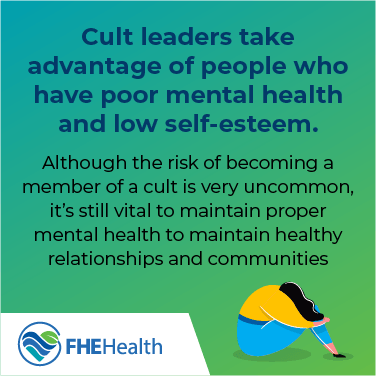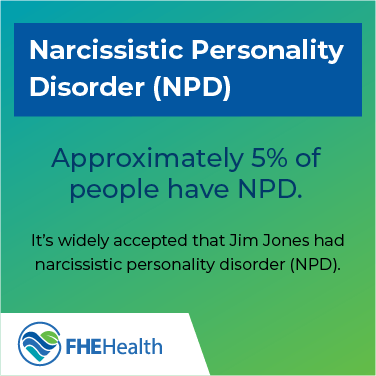
If you’ve ever wondered where the oft light-heartedly used phrase “drinking the Kool-Aid” came from, it’s a dark reference to the 1978 Jonestown tragedy, in which hundreds of cult members were convinced by their leader to commit suicide. However, the story of cult leader Jim Jones begins long before this tragedy. Jim Jones’s mental health struggles and rise to power serve as cautionary tales to both those with delusions of grandeur and the unwitting individuals who follow them.
Jim Jones’s Life and Death
 Jim Jones, born James Warren Jones in 1931, originally hailed from a small town in Indiana. Jones’s early childhood was fraught with the family’s financial woes, largely brought on by his father’s poor health. Jones became involved with his local Nazarene church after the pastor’s wife gave him a Bible. This sparked Jones’s interest in religion, and he attended numerous churches throughout Lynn, Indiana.
Jim Jones, born James Warren Jones in 1931, originally hailed from a small town in Indiana. Jones’s early childhood was fraught with the family’s financial woes, largely brought on by his father’s poor health. Jones became involved with his local Nazarene church after the pastor’s wife gave him a Bible. This sparked Jones’s interest in religion, and he attended numerous churches throughout Lynn, Indiana.
After graduating high school in 1945, Jones attended Indiana University Bloomington and married Marceline Baldwin, a nurse he met while working at a hospital. The couple had arguments about religion, as Baldwin was a Methodist and Jones strongly rebuked the church’s acceptance of segregation. Jones also became increasingly interested in communism and began attending gatherings of the Communist Party USA.
Jones eventually formed the Peoples Temple in 1955. His vision was a Pentecostal movement that combined his passions for civil rights and socialism with religion. Jones came in contact with another leader named Father Divine and adopted his heavy-handed, controlling practices for the Peoples Temple.
In the 1960s, Jones relocated the Peoples Temple from Indiana to San Francisco and later built a commune in Guyana, commonly known as Jonestown. Reports of abuse there were made public, which prompted investigation from prominent members of the United States government. Congressman Leo Ryan of California visited Jonestown as part of a delegation to check on family members who were concerned about their loved ones. The delegation was attacked at the airstrip shortly before their departure by armed members of ‘the temple’s red brigade’ security squad, killing 5 including Congressman Leo Ryan. Shortly after the events on the airfield, the deaths at Jonestown would begin. Paranoid that the Peoples Temple was under attack, Jones convinced nearly 1,000 cult members to commit mass suicide by drinking Flavor Aid laced with cyanide.
What Is Known About Jim Jones’s Mental Health?
 It’s probable that Jones suffered from depression during his adolescence, given his family’s chronic poverty and misfortune. About his childhood, Jones remarked, “I was ready to kill by the end of the third grade. I mean, I was so aggressive and hostile, I was ready to kill. Nobody gave me love, any understanding.”
It’s probable that Jones suffered from depression during his adolescence, given his family’s chronic poverty and misfortune. About his childhood, Jones remarked, “I was ready to kill by the end of the third grade. I mean, I was so aggressive and hostile, I was ready to kill. Nobody gave me love, any understanding.”
Jim Jones always had an eccentric personality, but his mental health struggles came to the forefront when he became more involved in various political and religious initiatives. He strongly rejected traditional Christianity, ostensibly because it wasn’t radical enough to accommodate his progressive views on race and politics. Jones used his status as the Peoples Temple leader as a way to exert control over his followers and dictate nearly every aspect of their lives.
It’s widely accepted that Jones had narcissistic personality disorder (NPD). Today, it’s estimated that approximately 5% of people have NPD. As with most cult leaders, his allure was that of a charismatic, dynamic leader who captivated his followers through passionate speech and displays of benevolent power. However, in reality, Jones was a megalomaniac who used religion and drugs to manipulate vulnerable and marginalized people.
What Is Known About His Drug Use?
 Jones’s turn toward illicit drugs came much later in his life after he had already established the People’s Temple. In fact, as a teenager, he chastised his classmates for their substance usage. However, in 1965, Jones moved the Peoples Temple to San Francisco, California, and his drug habit formed quite quickly thereafter. He began self-medicating with painkillers, and by 1971, his substance usage had expanded to amphetamines, Quaalude and pentobarbital, among other drugs. Jim Jones’s amphetamine use, specifically, was a leading cause of his paranoia about the fate of the Peoples Temple.
Jones’s turn toward illicit drugs came much later in his life after he had already established the People’s Temple. In fact, as a teenager, he chastised his classmates for their substance usage. However, in 1965, Jones moved the Peoples Temple to San Francisco, California, and his drug habit formed quite quickly thereafter. He began self-medicating with painkillers, and by 1971, his substance usage had expanded to amphetamines, Quaalude and pentobarbital, among other drugs. Jim Jones’s amphetamine use, specifically, was a leading cause of his paranoia about the fate of the Peoples Temple.
Although Jones’s followers were killed by ingesting cyanide, Jones himself died from a self-inflicted gunshot. His autopsy revealed that he had a large amount of pentobarbital, which would have been lethal had he not built up such a strong tolerance to drugs.
It’s important to note that Jones continued to preach against drug use to his followers even as he participated in heavy substance abuse. Displays of hypocrisy and manipulation such as this are usually some of the hallmarks of cult leaders.
Drug Use Was Common in His Cult
Although recreational drug use was forbidden for cult members, drugs were one of the primary methods Jones used to control his followers. Members who were unruly or non-compliant were often sedated with tranquilizers. Jones’s own children were known to consume the drugs he would leave strewn about. After the massacre, thousands of drugs were discovered in a warehouse, most of which are thought to have been smuggled into Guyana by members of the Peoples Temple.
The Psychology of Cults
Cult leaders usually prey on people’s need for belonging and comfort. In the cases of religious-based cults, it’s common for leaders to present themselves as messiah-like figures and claim to have a superior spiritual connection to a deity.
Renowned sociologist Dr. Janja Lalich says, “A healthy religion has you worshiping some type of higher being … you’re not expected to worship this human being standing in front of you.” As time went on and Jones gained a larger following, he increasingly demanded loyalty and obedience to both the cult and himself as the leader.
It is relatively rare for a cult to grow to the size of the Peoples Temple. At its peak, the Peoples Temple had over 3,000 members, more than 900 of which died in the Jonestown Massacre in 1978. The sheer size of the Peoples Temple underscores Jones’s ability to manipulate and control.
The Importance of Treating Mental Health Disorders
Although the risk of becoming either a leader or member of a cult is very uncommon, it’s still vital to maintain proper mental health to maintain healthy relationships and communities. Narcissistic personality disorder is one common trait among people who assert themselves as leaders for nefarious purposes. Additionally, people who join cults typically have poor mental health and low self-esteem. This is often what cult leaders take advantage of to gain power.
If you or a loved one is experiencing loneliness, poor mental health or low self-esteem, contact us at FHE to learn more about our programs. You can also call (833) 685-7542 to speak to a trained professional and start along the road to improved mental health.






